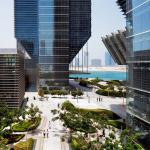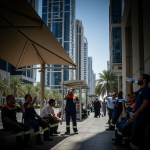Life in the UAE offers a vibrant and exciting experience, but the arid desert climate presents unique challenges to our health and well-being. The intense sun, high temperatures, and dry air demand careful attention to sun safety, hydration, and nutrition to thrive in this environment. Whether you're a new resident or a long-time expat, understanding how to adapt your lifestyle is crucial for maintaining optimal health and energy levels. This comprehensive guide will equip you with the knowledge and practical tips you need to stay healthy and enjoy life in the desert.
Part 1: Conquering the Sun: Essential Sun Safety Strategies
The UAE's sun is powerful year-round, but its intensity peaks during the summer months. Protecting yourself and your family from harmful ultraviolet (UV) radiation is paramount to prevent sunburn, premature aging, and the increased risk of skin cancer.
1. The Power of Sunscreen: Your Daily Shield
Sunscreen is your first line of defense against UV rays. Make it a non-negotiable part of your daily routine, even on cloudy days, as UV radiation can penetrate clouds.
- Choose Broad Spectrum: Opt for a broad-spectrum sunscreen that protects against both UVA and UVB rays. UVA rays contribute to aging, while UVB rays are the primary cause of sunburn.
- High SPF is Key: Select a sunscreen with a Sun Protection Factor (SPF) of 30 or higher. SPF indicates how well a sunscreen protects against UVB rays.
- Apply Generously: Most people don't use enough sunscreen. Apply a generous amount – about a shot glass full for your entire body – to all exposed skin at least 15-30 minutes before sun exposure. Don't forget often-missed areas like the ears, back of the neck, and tops of your feet.
- Reapply Regularly: Reapply sunscreen every two hours, or immediately after swimming, sweating, or toweling off.
- Consider Different Formulations: Sunscreen comes in lotions, sprays, sticks, and gels. Choose a formulation you find comfortable and easy to apply consistently.
2. Seek Shade: Your Natural Sanctuary
Whenever possible, seek shade, especially during the sun's peak hours, which are typically between 10 a.m. and 4 p.m.
- Utilize Shade Structures: Take advantage of umbrellas, canopies, trees, and shaded areas when you're outdoors.
- Plan Activities Wisely: Schedule outdoor activities for early mornings or late afternoons when the sun's intensity is lower.
- Be Mindful of Reflective Surfaces: Remember that surfaces like sand, water, and concrete can reflect UV rays, increasing your exposure even when you're in the shade.
3. Protective Clothing: Your Wearable Armor
Wearing appropriate clothing can provide significant protection from the sun.
- Choose Tightly Woven Fabrics: Opt for tightly woven fabrics that block more UV radiation.
- Darker Colors Offer More Protection: While counterintuitive, darker-colored fabrics generally absorb more UV rays than lighter colors.
- Consider UPF Clothing: Clothing with an Ultraviolet Protection Factor (UPF) rating indicates how effectively it blocks UV radiation.
- Long Sleeves and Pants: When spending extended periods outdoors, wear long-sleeved shirts and long pants to cover more skin.
4. Hats: Shielding Your Head and Face
A wide-brimmed hat is an essential accessory for sun protection in the desert.
- Wide Brim is Crucial: Choose a hat with a brim that is at least 3 inches wide and encircles your entire head to protect your face, ears, and neck.
- Consider Different Styles: Options include wide-brimmed straw hats, canvas hats, and hats with neck flaps for extra coverage.
5. Sunglasses: Protecting Your Eyes
Prolonged exposure to UV radiation can damage your eyes and increase the risk of cataracts and other eye conditions.
- Choose 100% UV Protection: Select sunglasses that block 100% of UVA and UVB rays.
- Consider Larger Frames: Larger frames offer more coverage and help protect the delicate skin around your eyes.
- Darkness of Tint Doesn't Equal Protection: The darkness of the lenses doesn't indicate the level of UV protection. Always check the label for UV protection information.
Part 2: The Lifeline of the Desert: Prioritizing Hydration
The dry desert air and high temperatures in the UAE lead to increased sweat evaporation, making dehydration a significant health risk. Maintaining adequate hydration is crucial for regulating body temperature, supporting organ function, and preventing heat-related illnesses.
1. Drink Water Regularly: Your Internal Cooling System
Make drinking water a conscious and consistent habit throughout the day, even if you don't feel thirsty.
- Carry a Water Bottle: Keep a reusable water bottle with you and refill it frequently.
- Set Reminders: Use alarms or apps to remind yourself to drink water regularly.
- Don't Wait Until You're Thirsty: Thirst is a sign that you're already slightly dehydrated.
- Increase Intake During and After Activity: Drink extra fluids before, during, and after any physical exertion.
2. Know Your Hydration Needs:
Individual hydration needs vary based on factors like activity level, body weight, and the weather conditions. However, aim for at least the generally recommended daily intake, and increase it in the desert climate.
- Monitor Your Urine: Pale yellow urine is a good indicator of adequate hydration. Dark yellow or infrequent urination suggests dehydration.
3. Electrolyte Balance: More Than Just Water
Sweating not only depletes water but also essential electrolytes like sodium, potassium, and chloride. Maintaining electrolyte balance is crucial for proper bodily functions.
- Electrolyte-Rich Beverages: Consider consuming electrolyte-rich sports drinks, especially after prolonged or intense physical activity.
- Natural Electrolyte Sources: Include foods rich in electrolytes in your diet, such as bananas (potassium), leafy green vegetables (magnesium), and salty snacks in moderation (sodium).
- Be Mindful of Sugar Content: Choose sports drinks with lower sugar content or consider electrolyte tablets or powders that can be added to water.
4. Hydrating Foods: Fueling Up with Fluids
Incorporate water-rich fruits and vegetables into your diet to contribute to your overall fluid intake.
- Watermelon: High in water content and electrolytes.
- Cucumbers: Refreshing and hydrating.
- Strawberries: A good source of fluids and antioxidants.
- Oranges: Contain water and vitamin C.
- Leafy Greens: Contribute to hydration and provide essential nutrients.
5. Avoid Excessive Diuretics:
Be mindful of beverages and substances that can have a diuretic effect, leading to increased fluid loss.
- Caffeinated Drinks: Limit your intake of coffee, tea, and energy drinks.
- Alcohol: Avoid excessive alcohol consumption, as it can lead to dehydration.
Part 3: Nourishing Your Body: Smart Nutrition in the Desert
A balanced and nutritious diet is essential for maintaining energy levels, supporting your immune system, and adapting to the desert climate.
1. Focus on Fresh, Whole Foods:
Prioritize fruits, vegetables, whole grains, and lean protein sources in your diet. These provide essential vitamins, minerals, and antioxidants that support overall health.
2. Embrace Seasonal Produce:
While the UAE imports a wide variety of foods, try to incorporate locally grown and seasonal produce whenever possible. These are often fresher and may be better suited to the climate.
3. Don't Skip Meals:
Regular meals provide your body with the energy it needs to function optimally, especially in a demanding climate.
4. Be Mindful of Food Safety:
High temperatures can increase the risk of foodborne illnesses. Practice proper food handling and storage techniques.
- Refrigerate Perishables Promptly: Don't leave food out at room temperature for extended periods.
- Cook Food Thoroughly: Ensure meat, poultry, and eggs are cooked to the appropriate internal temperatures.
- Wash Fruits and Vegetables: Rinse all produce thoroughly before consumption.
5. The Importance of Electrolyte-Rich Foods:
As mentioned earlier, incorporating foods rich in electrolytes can help maintain balance, especially if you are active or sweating a lot.
6. Moderation is Key:
While enjoying the diverse culinary scene in the UAE, practice moderation in your intake of processed foods, sugary drinks, and unhealthy fats.
7. Consider Vitamin D Supplementation:
While the UAE has abundant sunshine, many residents, particularly those who spend most of their time indoors, may be deficient in Vitamin D. Consult your doctor about whether Vitamin D supplementation is right for you. Vitamin D plays a crucial role in bone health and immune function.
Part 4: Recognizing and Responding to Heat-Related Illnesses
Despite taking precautions, it's important to be aware of the signs and symptoms of heat-related illnesses and know how to respond.
- Heat Rash: Skin irritation caused by excessive sweating. Keep skin cool and dry.
- Heat Cramps: Painful muscle spasms, usually in the legs or abdomen, due to electrolyte imbalance. Rest in a cool place and drink fluids with electrolytes.
- Heat Exhaustion: A more serious condition characterized by heavy sweating, pale and clammy skin, dizziness, headache, nausea, and rapid, weak pulse. Move to a cool place, loosen clothing, and drink fluids with electrolytes. Seek medical attention if symptoms don't improve.
- Heatstroke: A life-threatening emergency characterized by a high body temperature (104°F or higher), hot, dry skin (or profuse sweating), rapid, strong pulse, and possible confusion or loss of consciousness. Call for emergency medical help immediately and try to cool the person down while waiting for assistance.
Conclusion: Thriving in the Desert Environment
Staying healthy in the desert climate of the UAE requires a proactive and informed approach. By prioritizing sun safety, maintaining consistent hydration, and nourishing your body with a balanced diet, you can mitigate the health risks associated with the intense heat and dry air. Make these practices a fundamental part of your daily routine, and you'll be well-equipped to thrive and enjoy all that the UAE has to offer, while safeguarding your long-term health and well-being. Remember to consult with healthcare professionals for personalized advice tailored to your individual needs.










